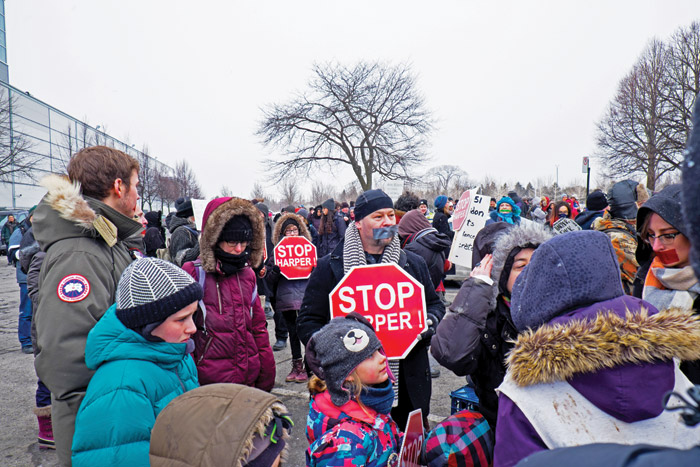Hundreds of Canadians came together in Montreal and other Canadian cities last Saturday to take part in the Canada-wide day of action against Bill C-51, a proposed federal anti-terrorism bill.
Bill C-51 encompasses a wide range of proposed changes to Canadian legislature, in particular to the Criminal Code. It will affect disclosure of crime-related information and evidence within the government and criminalize the expression of terrorist-related ideas.
The bill was introduced by the Conservative government in January and is currently being reviewed by the House of Commons. It passed its second reading in the House on Feb. 23 with a vote of 176-87. The bill will still need to undergo four more stages, including a Committee stage and a third reading, before it can be passed.
The bill also broadens the scope of police powers as they would be able to arrest a suspect if they believe a terrorist act may be carried out, whereas without the bill, sufficient proof was required. Consequently, many Canadians fear that the bill will violate their civil rights and liberties, namely their right to privacy. Elizabeth Viatkin was one such protester who expressed this view.
“I value my privacy, I don’t think that’s necessary information for the government to have,” Viatkin said. “They’re trying to rush [the bill] through [Parliament] right now. I think this is the kind of bill that you should think about a bit more before just trying to rush it and [hope] people won’t have time to protest.”
Protester Mariah Gillis, a Concordia student, expressed concerns about what C-51 defines as a terrorist act.
“I really think that C-51 is terrible,” Gillis said. “The part about how if you disrupt natural resource extraction, you could be considered a terrorist—that’s pretty scary. Also, all of the spying and everything—it’s just pretty draconian.”
The Montreal march began at Parc Jarry and ended outside the office of Liberal Party of Canada Leader Justin Trudeau, who has said he supports the bill.
Dozens of protesters placed tape over their mouths and held signs bearing messages that read “Stop Harper” and “C-51 is an act of terror” while chanting: “Harper terrorist, Trudeau complicit.”
New Democratic Party of Canada (NDP) leader Thomas Mulcair, who is also leader of the official opposition, has argued against Bill C-51 as well. He joined the Montreal march and gave a speech reiterating his intentions to oppose the bill.
“C-51 is a bill that could seriously endanger our right to protest peacefully, to stand up against a government or an infrastructure or an economic policy,” he said. “Mr. Harper has never been able to give a single example of why this bill is necessary.”
Viatkin agreed with Mulcair’s statement, suggesting an ulterior motive for the bill’s implementation.
“Honestly, I don’t think we have that much of a problem with terrorism here,” she said. “We have maybe more of a problem with xenophobia.”
Gillis shared her hopes that the protest would help more Canadians become aware of the issue.
“I think it’s important that we voice our opposition and that we make it really clear that a majority of people are really against this,” she said. “If more people see others voicing their opinions about it, they might start to think about it more and might start to get involved. Obviously, this march is not going to change everything, but I think it’s a small step towards something better.”







